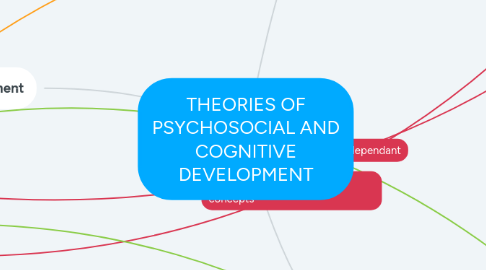
1. KOHLBERG- Moral Development
1.1. Punishment- obedience orientation
1.1.1. Fear of getting caught
1.1.2. Avoids punishments
1.2. Instrumental relativist orientation
1.2.1. The Golden Rule
1.2.2. Courteous
1.3. Good Boy- Nice Girl orientation
1.3.1. Do the right things
1.3.2. Desire praise from others
1.4. Law and Order orientation
1.4.1. Studious
1.4.2. Becoming organized
1.5. Social Contract orientation
1.5.1. Doesn't want to hurt others
1.5.2. Argumentative
1.6. Universal Ethical Principal orientation
1.6.1. Ethical
1.6.2. Decisive
1.6.3. Gains a sense of Morals
2. PIAGET- Cognitive Development
2.1. Sensorimotor
2.1.1. Object permance
2.1.2. Recognize patterns of behavior
2.1.3. Birth-2 years of age
2.2. Preoperational
2.2.1. Start developing language skills
2.2.2. Unable to see things from others' perspectives
2.2.3. 2-7 years of age
2.3. Concrete Operational
2.3.1. Understand conversation
2.3.2. Limited to their experiences
2.3.3. Beginning stages of understanding advanced concepts
2.3.4. 7-11 years of age
2.4. Formal Operational
2.4.1. Mentally manipulate relationships and variables
2.4.2. Complex language skills
2.4.3. Abstract thought
2.4.4. 11+ years of age
3. ERIKSON- Psychosocial Development
3.1. Trust vs. Mistrust
3.1.1. Needs consistency
3.1.2. Positive care produces a safe world
3.1.3. Inconsistent care gives a view of an unsafe and fearful world
3.1.4. Birth-1 year of age
3.2. Autonomy vs. Shame and Doubt
3.2.1. Able to do things at their own pace
3.2.2. Those who aren't able to do things at their own pace get feelings of shame and doubt
3.2.3. 2-3 years of age
3.3. Initiative vs. Guilt
3.3.1. Starts making some of their own decisions
3.3.2. Gets questions answered to encourage initiative
3.3.3. When children are always told what to do and people treat their questions as a nuisance encourages guilt
3.3.4. 4-5 years of age
3.4. Industry vs. Inferiority
3.4.1. Encouragement is needed to do thing effectively and well
3.4.2. A sense of inferiority is developed if treated harshly
3.4.3. 6-11 years of age
3.5. Identity vs. Role Confusion
3.5.1. Various roles are given to find identity
3.5.2. A lack of stability contributes to role confusion
3.5.3. 12-18 years of age
